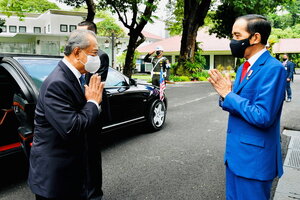Neighborly nudges to restore Myanmar's democracy
Two of Southeast Asia’s democracies call for an urgent meeting in the region to reverse the military coup in Myanmar.

Indonesian President Joko Widodo (r) greets Malaysian Prime Minister Muhyiddin Yassin in Jakarta, Indonesia, Feb. 5.
Courtesy of Laily Rachev/Indonesia's Presidential Palace/Handout via REUTERS
Worldwide, fewer than 1 in 10 people live in a full democracy. In fact, largely as a result of COVID-19 restrictions, last year saw the biggest rollback of individual freedoms ever undertaken by governments during peacetime, according to the Democracy Index. And now a military coup against an elected government in Myanmar has only worsened the trend. What can existing democracies do about it?
That’s exactly what Indonesia and Malaysia, two of Myanmar’s neighbors, asked on Friday. Their top leaders requested an urgent meeting of the 10-member Association of Southeast Asian Nations (ASEAN) to address Myanmar’s “backward” step on democracy.
“We fear the political unrest in Myanmar could disturb the security and stability in this region,” said Malaysian Prime Minister Muhyiddin Yassin in a meeting with his Indonesian counterpart.
For his part, Indonesian President Joko Widodo said, “It is important for all of us to respect the ASEAN Charter, particularly rule of law, good governance, democracy, human rights, and constitutional government.”
As a regional grouping, ASEAN itself is unlikely to act against one of its members. Six of the 10 countries – Brunei, Cambodia, Laos, Myanmar, Thailand, and Vietnam – have authoritarian regimes. Yet in the past, its democratic members, especially Indonesia, have used Asian-style consensus-making – dubbed “enhanced interaction” – to bring democratic change in Myanmar. In 2012, its military rulers allowed ASEAN election observers to monitor parliamentary elections.
“While ASEAN may work on the principle of consensus, ASEAN also works on the principle of peer pressure, and peer pressure can be very effective,” said George Yeo, Singapore’s former foreign minister, a decade ago.
Other regional groupings, such as those in Latin America, Europe, and Africa, have also found neighborly nudging to be effective. Nations in proximity to one another and often with shared history may carry more moral weight in holding dictators accountable than global institutions. The African Union, for example, helped mediate a democratic transition in Sudan in 2019.
Brunei, a small sultanate that is ASEAN’s current chair, has yet to call a meeting over the Myanmar crisis. Yet it did cite the ASEAN Charter’s democratic principles in asking for dialogue in the country. Geographic neighbors not only watch each other, but they can also watch out for each other.

